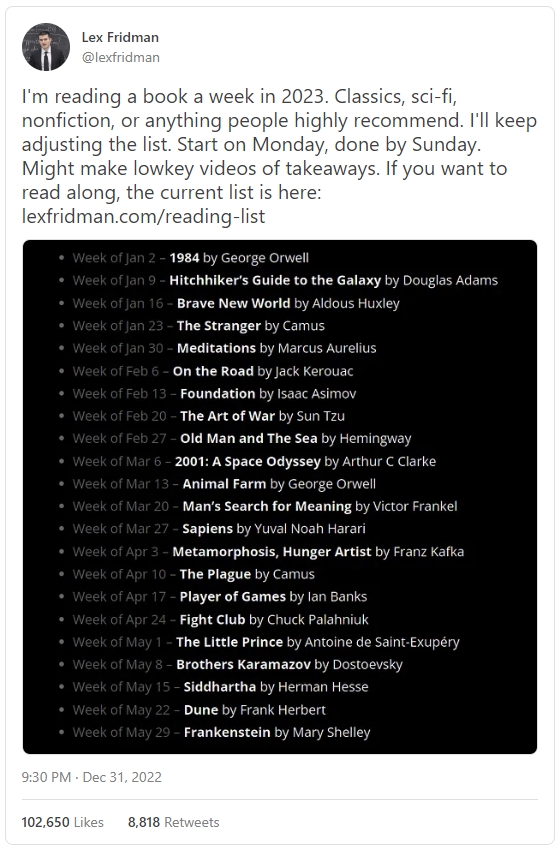(Because I practice what I preach, I am publishing this four months after it was in any way relevant.)
In January, Lex Fridman – world leader in inspiring people to Google “who is Lex Fridman?” – revealed his 2023 reading list.

It triggered a loud – and largely negative – reaction. Why?
Are the books on the list bad? No. They’re good books.
“I read those books when I was twelve!” Good job, you read smarter books than Lex Fridman. Here’s your medal.
Yes, his “book a week” schedule seems both arbitary and divorced from certain realities about books (for example, that they differ in length). He’s assigning the same amount of time to The Little Prince (a 16,000 word children’s book) as he is to The Brothers Karazmazov (a 356,000 word Russian realist epic). But that’s his funeral.
And yes, it’s depressing to see a humble everyday pleasure like reading books get smeared in Silicon Valley thinkfluencer slime. “My videos will deliver key takeaways with itemized action points! Follow along as I synergize my mindspace and growth-hack my quantified self with the ultimate disruptive tech…books!”
…but none of those criticisms really connect with the larger issue.
This is a terrible way to read books.
Unweaving the Rainbow
When I was a teenager, I listened primarily to metal bands. Upon turning twenty, I decided I needed to educate myself in classic rock.
But I wanted to do it fast. The Rolling Stones have twenty-nine albums? Bugger off, I’m not listening to all that. Can’t I just pick a highlight or two? I wanted to speedrun classic rock!
I dutifully acquired/downloaded a dozen classic “ok, boomer” albums, as ranked by lists like Rolling Stone’s Top 500 albums, including:
- Pink Floyd, The Dark Side of the Moon
- The Clash, London Calling
- Marvin Gaye, What’s Going On
- Bob Dylan, Blonde on Blonde
- The Beach Boys, Pet Sounds
Across one week, I listened to them all.
I got nothing out of it.
When an album finished, I could not recall a single note. These were classic, career-best albums, made by great artists (only some of whom are now suspected to have molested children)…yet they just bounced off my skull. I didn’t even dislike what I heard; I just instantly forgot about it. It was as though I’d created a dozen little black holes in my life, or induced a dozen bouts of waking amnesia.
I was obviously missing something very important. But what?
Eventually I realized that I hadn’t given myself any context to understand the music. I was basically trying to read an advanced foreign-language textbook, without taking the time to learn the language.
An album is not an album. It’s a record of the world the artist lived in. You can try to understand it on its own…but what if you took the time to understand the artist, and the things they were reacting to or pushing back against? You’re denying yourself part of the experience if you don’t.
If you stare at a painting long enough, you’ll eventually see the entire world bleeding through behind it.

The blue robes in Giovanni Battista Salvi da Sassoferrato’s Madonna and Child would have produced awed shock once. Blue pigment – or ultramarine – was the rarest of colors, worth more than its weight in gold. It was derived from the precious gemstone lapis lazuli, which could only be found in a single mine in remote Afghanistan. Cleopatra used powdered lapis for eyeshadow. Tutankhamun’s mask was made from it. During the Renaissance, merchants would haul it overland (a journey that took sevearl months) before shipping it to Venice. Its piercing color and immense price made it both highly sought after and freighted with mystic significance. Vermeer bankrupted his family buying it. Some artists cheated by using cheap azurite, and then applying a single thin layer lapis lazuli. To a Renaissance painter, ultramarine was the equivalent of bringing out the big guns. “Playtime’s over, fuckers. We’re using blue.“
…all of that context vanishes when you try to speedrun your way to a cultural appreciation. You see a woman. You see a baby. You vaguely suspect it’s Jesus or something. Next.
Critical theorist Julia Kristeva said “any text is constructed as a mosaic of quotations; any text is the absorption and transformation of another”[1]Kristeva, Julia. (1986). Word, dialogue, and the novel. She was talking specifically about intertextuality, but I think this is true of any meaning we take from art. They’re fragments of the world, refracted through the prism of an artist’s eyes and then into ours. They are not self-contained monadic artifacts, and it makes little sense to treat them as such.
We Could All Be Pierrots

When I listened to David Bowie’s Ziggy Stardust and the Spiders from Mars as part of my exercise, it produced no emotional response.
But I didn’t know who he was: I didn’t know about the kid growing up in post-War Britain. First a mod, then a hippie, then a gay man. Spinning through wardrobes and identities, learning that “authenticity” is a mug’s game, that you can make a career out of being a well-heeled fake.
I didn’t know what came next. Glam rock. Success. Moving to America. Cocaine. Paranoia. Creating Station to Station, and nearly dying in the process. Moving to Berlin. Making three of the most critically acclaimed albums of the 70s. Reinventing himself again in the 80s, experiencing massive commercial success, along with an incredible collapse in artistic quality. Decades spent in the wilderness, before finally managing an inspiring comeback (Blackstar) before he died.
The narrative I’ve told you is heavily bullshit: partly a media confabulation by Bowie himself, and partly my own imagination. It ignores significant parts of Bowie’s discography (where does Diamond Dogs fit in the picture? What about Outside?), and distorts others (two of the fabled “Berlin” albums were actually recorded in other cities). But I finally had a Rosetta Stone. I could finally speak the language.
David Bowie is now my favorite musician. It didn’t happen because I listened to his best music. It happened because I listened to his worst.
Lex and Violence

I worry that Lex Fridman is falling into the exact same trap I did at twenty.
He’s shoving 52 unrelated books into his brain as fast as he can, like an RPG player grinding their third alt to level 55 in time to raid Molten Core. He’s getting none of the context in which they were written. None of the writer’s personal history. He treats books as a fungible commodity. 1 book = 1 learnin’. 52 books = 52 learnin’s.
I truly don’t believe you can speed-run a cultural education in this way.
Imagine Donald Trump decides, in his infinite wisdom, to climb every famous mountain the world. Everest. Kilimanjaro. Annapurna. But he doesn’t want to go through all the trouble of climbing mountains, so he just uses a helicopter to fly him to the peak. Then he steps out, takes some photos for TruthGabSocialGettr or wherever he’s on, and then has his pilot fly him to the next mountain.
We’d consider that a poor substitute for mountain-climbing. In fact, we wouldn’t consider that mountain-climbing at all.
You can’t just experience a thing just by standing at the peak. There’s also a landscape to explore. If you want to climb a mountain, you have to actually climb.
To be fair to Lex, I don’t know in what spirit he’s reading these books. He claims he’s taking notes. He says some of them (possibly the Dostoyevsky?) are re-reads of past favorites. So there’s probably some effort there. But it also feels like he’s treating reading like an RPG stat that can be minmaxed.
What should Lex do instead?
Here’s what I’d do:
I’d go for a depth-first search rather than a breadth-first. Systematically explore one world, and then exhaust it before moving on to another.
You could carve literature into different domains in all sorts of ways. Maybe do it by time. First, read ancient literature. Then the Greek classics. Then Medieval literature. Build an understanding, and then build things on top of that. Assemble a mental picture of the world one fragment at a time.
Or break the world into distinct domains. Western literature. Eastern literature. Try not to let them cross – you wouldn’t hop from Siddhartha to The Plague until you were ready.
Or you could trace the movement of literature by influences and connection points, following it from node to node. One of my favorite literary movements is decadence. It’s a fascinating genre, but a hard one to get into.
First: read some books in romanticism: the 18th century forerunner of decadence. Absorb their vibes (intense emotions, along with a stultified and didactic sense of morality), and you’d get an idea of the soil decadence came from. It has the same sensory intensity of feeling, but makes it perverted and insane and corrupt.
What next? The poetry of Verlaine, Rimbaud, and Baudelaire. Joris-Karl Huysmans’ À Rebours, Oscar Wilde’s The Picture of Dorian Gray. Then you’d read some later exercises in sensual perversion that verge on surrealism, like Guillame Apollionaire’s erotic work, or Octave Mirbeau’s The Torture Garden.
“But that would take a lot of time!”
Yes, that’s the rub, isn’t it? Hobbies take time. The temptation to speed-run things is always there.
But if time is your chief constraint, why read the books at all? Why not just read their Wikipedia summaries of these books, and be done in an afternoon? I don’t know. I’m not the book police. Lex’s List is an improvement on not reading books at all.
You have to decide for yourself. Is there value in reading books or not…and if there is, why not read them properly?
References
| ↑1 | Kristeva, Julia. (1986). Word, dialogue, and the novel |
|---|
2 Comments »
Comments are moderated and may take up to 24 hours to appear.


Wow, I love your approach! I wish I had an English teacher like you. I think all the ways you mentioned are great ways to read, but Lex is a smart guy maybe he just wants to quickly read them at first to get familiar with then and then he will deep dive? I remember when I read Finnegans Wake, Gravities Rainbow, Invisible Cities and House of Leaves when I was in middle school. I understood none of it! But if I had done a depth-first search I would’ve never read them at all! Maybe Lex is a fast reader?
Comment by Justin — 2023-05-20 @ 08:39
Thanks. Some of Lex’s books are apparently re-reads (hopefully the longer ones).
I am convinced that not even Joyce understood Finnegans Wake, so you are not alone there.
Comment by admin — 2023-05-24 @ 11:25